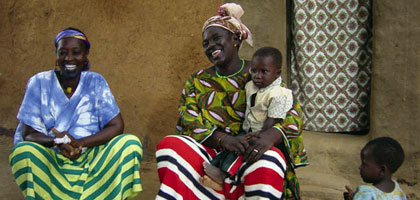
Mother Courage
Film of the Month: Moolaadé

Veteran African film-maker Ousmane Sembéne's Moolaadé takes a stand against female excision. But it's far from a simple polemic, says Philip Kemp.
At 82, the Senegalese-born director Ousmane Sembéne is widely regarded as the doyen of African film-makers. Apart from his debut feature La Noire de... (Black Girl, 1965), shot mainly in France, all his ten or so features have been located and shot in sub-Saharan West Africa, valiantly overcoming the vagaries of African production and distribution and, often enough, the disapproval of the same national authorities from whom he's been obliged to seek funding. While varying in scale from the domestic (Mandabi, 1968) to the epic (Ceddo, 1976; Camp de Thiaroye, 1988), Sembéne's films never neglect the social and political dimensions of their stories.
Sembéne's Marxist background - a former member of the Communist Party, he studied film-making in Moscow in the early 1960s under Mark Donskoi and Sergei Gerasimov - doesn't mislead him into taking a simplistic, blame-it-all-on-the-colonialists attitude to the problems he explores. Nor, unlike certain African film-makers, does he uncritically lament an Africa of stable, long-established custom gradually corrupted and undermined by brash western influences. His films are subtle and ambivalent, acknowledging the values of traditions and (in many cases) regretting their erosion while at the same time exposing the system of oppression and injustice they often upheld. The same person, the same impulse, can be at once admirable and deplorable. In Guelwaar (1992) the eponymous late political activist is celebrated as a hero and quite possibly a martyr in his people's cause - but Sembéne makes clear that his love of freedom and respect for human rights never extended to the members of his own family.
Likewise in Sembéne's latest film Moolaadé the villagers who support the practice of excision - the slicing away of most of the clitoris and labia of young girls, said to promote chastity and discourage female lust - invoke tradition in their cause: girls, they insist, have always been cut. (Whether this is true, or whether the practice is - as history seems to suggest - of fairly recent origin, is another matter.) But at the same time the film's heroine Mama Colle (Fatoumata Coulibaly) can turn tradition to her own ends. When four pre-adolescent girls who have fled the cutting ceremony come begging her for protection, she's able to grant them impregnable sanctuary simply by stringing a multi-coloured cord a few inches off the ground across the entrance to her courtyard. This flimsy barrier signifies the moolaadé (protection) of the film's title. To emphasise its insubstantiality, Sembéne repeatedly shows small children and animals hopping over it or crawling under it, yet not even the village chief, petty tyrant though he is, dare flout it. A more 'enlightened', westernised individual might well condemn the mutilation of the girls - but would equally, no doubt blithely, ignore the moolaadé. Gains and losses.
Moolaadé , like all Sembéne's films, is unashamedly polemical, an attack on a practice he regards as repugnant. "Female genital mutilation," he notes, "is practised in 38 of 54 member states of the African Union. Whatever the method used (traditional or modern), excision is a violation of the woman's dignity and integrity. I dedicate Moolaadé to mothers, women who struggle to abolish the legacy of bygone days." Which might suggest a piece of solemn agitprop. But solemnity rarely taints Sembéne's films; his anger and indignation are invariably tempered by his warmth, humour and generosity of spirit. In Xala (Impotence, 1974) he sums up the arrogance and corruption of the nouveau riche governing classes of a newly independent African state in one richly ludicrous image. Amid the parched, dusty streets of the capital a bureaucrat is having his gleaming limousine washed - in Perrier water.
The opening of Moolaadé shows Sembéne's affectionate, intimate view of African village life. In a brief couple of minutes before the arrival of the four fugitive girls sets the plot in motion, the roaming camera of Dominique Gentil (Sembéne's regular DoP since Guelwaar) draws us into the texture, the sounds, sights and colours - almost, it's easy to imagine, the smells - of this organic community. Women carry water in bowls on their heads. A baby cries as it's bathed. Goats bleat, chickens and cows roam about. Birds sing; somewhere a radio plays; women chant while they sweep or sew. Everywhere are the rich primary colours of dyed robes and hangings; the deep ochre of the earth and warm sandy hues of the huts contrast with the bright plastic of bowls and buckets. Quite apart from anything else, Sembéne's films offer a useful corrective to received western ideas of Africa as a starved, helpless continent, devoid of dignity and self-sufficiency.
Before this, though, under the credits, we see the arrival of the itinerant pedlar Mercenaire (Dominique T. Zeida). The only outsider in the village, this character goes through more of an arc than any other in the film. Initially he's seen as a comic rogue, almost a clown, tirelessly chatting up every woman who comes to his stall, blandly justifying his excessive prices. Gradually deeper, more sombre aspects emerge. There are whispers that he was jailed and dishonorably discharged from the army, and Colle's daughter Amasatou (Salimata Traore) uses his nickname as an insult, saying it means "a man who kills women and children." But it turns out that Mercenaire was a member of a UN peacekeeping force, that he hates violence, and that he was jailed on a trumped-up charge when he exposed officers misappropriating the wages of his fellow-soldiers. (Echoes here of Camp de Thiaroye, about the events in 1944 Dakar when black Free French troops mutinied after the French government milked them of their back pay.) And when Colle's husband Ciré (Rasmane Ouedraogo) publicly flogs her, it's only Mercenaire who dares tear the whip from Ciré's hand. For this he's hounded out of the village and murdered: his nocturnal departure, pursued by a silent group of men bearing torches, their faces painted as white ghostly masks, makes a sinister contrast with his joyful, sunlit arrival, cheered by laughing women.
It comes at the darkest moment of the film. Events are already shadowed by the deaths of three of the six girls who fled the excision ceremony: two, thought to have escaped to the city, are found dead at the bottom of a well, while another, enticed over the protecting cord by her own mother, dies under the knife. The mother Saalba (Lala Drabo) weeps helplessly; it turns out that this is the second daughter she has lost to the excisers' knives. But there's no reproach from the other women, only sympathy. These deaths, the flogging of Colle, and the men's pig-headed pettiness in confiscating and burning the women's prized radios ("Our men want to lock up our minds," one woman exclaims) all bring matters to a head and lead to the final dramatic confrontation.
This showdown ("No girl will ever get cut - never!", is the cry) is perhaps the film's weakest point. It's hard to imagine the entrenched forces of patriarchy, priestesshood (the grim-faced, red-robed sorority of excisers) and religion (Islam is consistently invoked in justification of cutting) would capitulate quite so easily. But Sembéne - who has always acclaimed the resilience of women and plans Mooladé as the second in a loose trilogy of films embodying "heroism in everyday life" (in the first, 2000's Faat-Kiné, a woman surmounts the stigma of unwed motherhood) - unmistakably intends a celebration of female solidarity. And whatever its dramatic plausibility, the sheer liberating exhilaration of this ending is all but impossible to resist.
